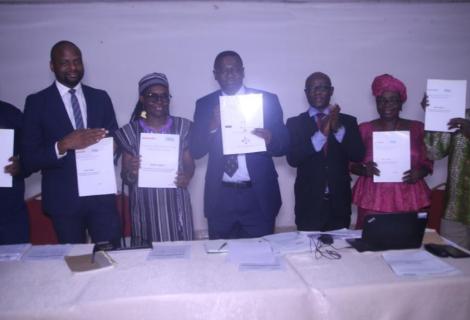
FIRST FAIR TAX MONITORING STUDY POLICY BRIEF
SIERRA LEONE'S FIRST FAIR TAX MONITORING STUDY POLICY BRIEF
Domestic Resource Mobilization (DRM) is of prime importance for any country to meet its development aspirations, inclusive of Sierra Leone. In its Mid-Term National Development Plan (MTNDP) 2019- 2023, Sierra Leone planned to spend approximately US8.15 billion to meet its development aspirations. The plan intends on restoring macroeconomic stability through fiscal consolidation, which involves intensifying domestic revenue collection and expenditure rationalization[1]. While the emphasis is placed on the need for domestic resources to play a key role in financing development, natural resource-rich[2] Sierra Leone is ranked 181/189 countries on the Human Development Index (HDI), with 64%[3] of people still living in poverty and unemployment standing at over 70%.[4] This naturally begs the question of where the much-needed domestic resources to finance development should come from and if will be raised in a fairway.
Fairness in revenue mobilization plus the efficient utilization of the revenue proceeds is a fundamental concern for all countries including Sierra Leone. It is however always difficult to measure fairness, especially when data is not readily available. International NGOs and think tanks like ActionAid, Oxfam Novib, and Tax Justice Network–Africa in collaboration with partners and Oxfam Country Offices succeeded in developing the Fair Tax Monitor (FTM) Methodology in December 2014. The FTM Methodology assesses, compares and evaluates fairness; and investigates the general characteristics of countries’ tax systems based on a Common Research Framework (CRF)[5] developed by the FTM Methodology experts.
The FTM Working Group identifies a fair tax system to include the following:(1) progressive and serves as a mechanism to redistribute income in a gender responsive way; (2) allows to raise sufficient revenue to perform government functions and provide high-quality essential public services; (3) refrains from and eliminates tax exemptions and incentives to the elite (individuals and corporate); and (4) tackles causes of illicit capital flight and tax evasion & avoidance by multinational companies and the wealthy
[1] Sierra Leone’s Medium-Term National Development Plan 2019-2023, available at https://www.slurc.org/uploads/1/0/9/7/109761391/sierra_leone_national_development_plan.pdf/
[2] International Trade Administration, 2021, https://www.trade.gov/country-commercial-guides/sierra-leone-mining-and-mineral-resources#:~:text=Sierra%20Leone%20is%20well%20known,well%20as%20promising%20petroleum%20potential./
[3] Sierra Leone Multidimension Poverty Index, 2019 available at https://ophi.org.uk/wp-content/uploads/Sierra_Leone_MPI_2019_final.pdf/
[4] United Nations Development Programme, 2021, About Sierra Leone available at https://www.sl.undp.org/content/sierraleone/en/home/countryinfo.html/
[5] The CRF was developed throughout a pilot phase in 2015/2016 and was first applied to four pilot countries, namely: Bangladesh; Pakistan; Uganda; and Senegal. In 2017, the CRF was further revised and implemented in nine countries, including Senegal, Tunisia, Nigeria, Uganda, Occupied Palestinian Territories, Pakistan, Bangladesh, Viet Nam, and Cambodia.